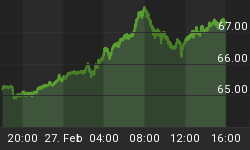In light of today's positive economic data out of China, I thought I would reproduce a segment from NFTRH 255 (9.8.13) that speculated upon the possibility of a new up cycle in inflation expectations based in large part on China and its credit growth cycle (on which central planners have announced a planned clampdown).
China industrial, retail data beat forecasts
The Greenspan Fed provides a handy reference as to how long it can take for a withdrawal of policy to manifest in a new economic deceleration.
China, US & Inflation

The Shanghai stock market has declined steadily since the post-bubble rebound in 2009. Further, after a record amount of credit-based stimulus, central planners are promoting a withdrawal of credit.
China Record Drop in Credit Growth Puts Momentum at Risk -Bloomberg
"China's leaders are extending a clampdown on credit, prompting analysts from JPMorgan Chase & Co. to Societe Generale SA to caution that the economy is vulnerable to weakening after the pickup so far this quarter."
But with the SSEC at notable long-term support, it is appropriate to question whether a bounce in the global growth engine (China) is in the cards.

The China 25 found support and has been rising since early summer. After a strong rise last week 38 is now the key level by the weekly chart [ed: FXI broke through this level yesterday] . It is notable that this rise has taken place against a modest decline in many US markets over the last 5 weeks. Exceptions in the US are technology and to a lesser degree, semiconductors, which service a global customer base.
We all know that China is considered an engine of global growth, so if its credit inflation to date were to manifest in an inflationary growth cycle, there would be trade opportunities in US equities. But broader Asia and emerging markets would be expected to be part of the play as well and could actually out perform.
Returning to the question of sustainability posed by the fretting analysts at JP Morgan and Societe Generale, let's note that Alan Greenspan's famous bubble in commercial credit lived on well after his Fed began to withdraw official accommodation at the beginning of 2004.

So in consideration of the ongoing pull between the deflation and inflation arguments NFTRH simply wants to know what the next tradable cycle will be. While threatened policy tightening in the US and China paints the headlines toward an anti-inflationary stance, we consider a potential lag time between actual (never mind threatened ) policy withdrawal and asset market response (which usually comes in the form of utter liquidation in the 'Age of Inflaton on Demand' ™).
Aside from being a road map potentially instructing about Chinese policy, the above chart tells us in striking detail just how desperately inflationary the Ben Bernanke Federal Reserve is and has been. Never mind the "taper" obsession, this Fed has routinely held ZIRP through thick and thin since 2008 with the only media noise I have seen coming last week from some Fed talking head going on about the first rate hike, out in late 2015!
Fed's Evans: 1st Rate Hike in Late 2015
Ha ha ha Charles, quit the Fed and hit the standup comedy circuit.
The Fed talks "taper" because interest rates are rising to challenge its image of authority and control. Why are interest rates rising? In large part because China is selling Treasury bonds. Why is China selling Treasury bonds? How would I know? I write a macro market newsletter and do not sit on the Central Planning Bureau.
But if I were to make an educated guess I'd say that the utility of funding US growth is no longer considered to be in China's best interest [ed: as China has been using credit to fund its own growth; one wonders however, if China may settle in for a while as a net buyer of T bonds once again, given the interest rate hype in the US as T bond yields come to target??] and the US Fed's bald-faced ZIRP (i.e. systematic inflationary policy) is, despite the global upset and deflationary pull of the Euro crisis and China's slowdown, considered to be an inflationary act.
Bottom Line
We are open to an 'inflation trade', which would be a trade only. In this week's report we will check up on several elements that would be key to a cycle in which inflation expectations could start to emerge and manifest in certain asset markets appreciating in a cyclical up phase. Meanwhile, on the micro term we'll continue to scout for the answer to the 'will they or won't they?' question regarding a final near term decline to support, especially in US stock markets, prior to such an asset market rally [ed: it's not looking that way as of Tuesday morning, as the rally may already be started, led by two prime players, China and US technology] .















